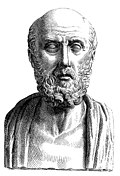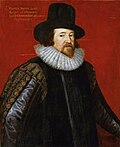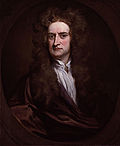Portal:History of science
The History of Science Portal
The history of science covers the development of science from ancient times to the present. It encompasses all three major branches of science: natural, social, and formal. Protoscience, early sciences, and natural philosophies such as alchemy and astrology that existed during the Bronze Age, Iron Age, classical antiquity and the Middle Ages, declined during the early modern period after the establishment of formal disciplines of science in the Age of Enlightenment.
Science's earliest roots can be traced to Ancient Egypt and Mesopotamia around 3000 to 1200 BCE. These civilizations' contributions to mathematics, astronomy, and medicine influenced later Greek natural philosophy of classical antiquity, wherein formal attempts were made to provide explanations of events in the physical world based on natural causes. After the fall of the Western Roman Empire, knowledge of Greek conceptions of the world deteriorated in Latin-speaking Western Europe during the early centuries (400 to 1000 CE) of the Middle Ages, but continued to thrive in the Greek-speaking Byzantine Empire. Aided by translations of Greek texts, the Hellenistic worldview was preserved and absorbed into the Arabic-speaking Muslim world during the Islamic Golden Age. The recovery and assimilation of Greek works and Islamic inquiries into Western Europe from the 10th to 13th century revived the learning of natural philosophy in the West. Traditions of early science were also developed in ancient India and separately in ancient China, the Chinese model having influenced Vietnam, Korea and Japan before Western exploration. Among the Pre-Columbian peoples of Mesoamerica, the Zapotec civilization established their first known traditions of astronomy and mathematics for producing calendars, followed by other civilizations such as the Maya.
Natural philosophy was transformed during the Scientific Revolution in 16th- to 17th-century Europe, as new ideas and discoveries departed from previous Greek conceptions and traditions. The New Science that emerged was more mechanistic in its worldview, more integrated with mathematics, and more reliable and open as its knowledge was based on a newly defined scientific method. More "revolutions" in subsequent centuries soon followed. The chemical revolution of the 18th century, for instance, introduced new quantitative methods and measurements for chemistry. In the 19th century, new perspectives regarding the conservation of energy, age of Earth, and evolution came into focus. And in the 20th century, new discoveries in genetics and physics laid the foundations for new sub disciplines such as molecular biology and particle physics. Moreover, industrial and military concerns as well as the increasing complexity of new research endeavors ushered in the era of "big science," particularly after World War II. (Full article...)
Selected article -
The history of military technology, including the military funding of science, has had a powerful transformative effect on the practice and products of scientific research since the early 20th century. Particularly since World War I, advanced science-based technologies have been viewed as essential elements of a successful military.
World War I is often called "the chemists' war", both for the extensive use of poison gas and the importance of nitrates and advanced high explosives. Poison gas, beginning in 1915 with chlorine from the powerful German dye industry, was used extensively by the Germans and the British; over the course of the war, scientists on both sides raced to develop more and more potent chemicals and devise countermeasures against the newest enemy gases. Physicists also contributed to the war effort, developing wireless communication technologies and sound-based methods of detecting U-boats, resulting in the first tenuous long-term connections between academic science and the military. (Full article...)
Selected image

An anthropometric device (side view) by Major A.J.N. Tremearne designed "for measuring the living head" for "the use of anthropologists", invented in 1913 with later additions made at the suggestion of A. Keith and Karl Pearson.
Did you know
...that Einstein's famous letter to FDR about the possibility of an atomic bomb was actually written by Leó Szilárd?
...that geology was transformed in the latter part of the 20th century after widespread acceptance of plate tectonics?
...that the idea of biological evolution dates to the ancient world?
Selected Biography -
Louis Alexander Slotin (/ˈsloʊtɪn/ SLOHT-in; 1 December 1910 – 30 May 1946) was a Canadian physicist and chemist who took part in the Manhattan Project. Born and raised in the North End of Winnipeg, Manitoba, Slotin earned both his Bachelor of Science and Master of Science degrees from the University of Manitoba, before obtaining his doctorate in physical chemistry at King's College London in 1936. Afterwards, he joined the University of Chicago as a research associate to help design a cyclotron.
In 1942, Slotin was invited to participate in the Manhattan Project, and subsequently performed experiments with uranium and plutonium cores to determine their critical mass values. After World War II, he continued his research at Los Alamos National Laboratory in New Mexico. On 21 May 1946, he accidentally triggered a fission reaction, which released a burst of hard radiation. He was rushed to the hospital and died nine days later on 30 May. Slotin had become the second fatal victim of a criticality accident in history, following Harry Daghlian, who had died of a related accident with the same plutonium "demon core" the previous year. (Full article...)
Selected anniversaries
- 1551 - Death of Joachim Vadian, Swiss humanist (b. 1484)
- 1613 - Birth of Stjepan Gradić, Croatian philosopher and scientist (d. 1683)
- 1829 - Death of Niels Henrik Abel, Norwegian mathematician (b. 1802)
- 1838 - Death of José Bonifácio de Andrade e Silva, Brazilian statesman and geologist (b. 1763)
- 1851 - Birth of Guillaume Bigourdan, French astronomer (d. 1932)
- 1911 - Birth of Feodor Felix Konrad Lynen, German biochemist, Nobel laureate (d. 1979)
- 1920 - Birth of Edmond H. Fischer, Swiss-American biochemist, Nobel laureate
- 1928 - Birth of James D. Watson, American geneticist, Nobel laureate
- 1949 - Birth of Horst Ludwig Störmer, German-born physicist, Nobel laureate
- 1961 - Death of Jules Bordet, Belgian immunologist, recipient of the Nobel Prize in Physiology or Medicine (b. 1870)
- 1963 - Death of Otto Struve, Russian-born astronomer (b. 1897)
- 1965 - Launch of Early Bird, the first communications satellite to be placed in geosynchronous orbit
Related portals
Topics
General images
Subcategories
Things you can do
Help out by participating in the History of Science Wikiproject (which also coordinates the histories of medicine, technology and philosophy of science) or join the discussion.
Associated Wikimedia
The following Wikimedia Foundation sister projects provide more on this subject:
-
Commons
Free media repository -
Wikibooks
Free textbooks and manuals -
Wikidata
Free knowledge base -
Wikinews
Free-content news -
Wikiquote
Collection of quotations -
Wikisource
Free-content library -
Wikiversity
Free learning tools -
Wiktionary
Dictionary and thesaurus









































































